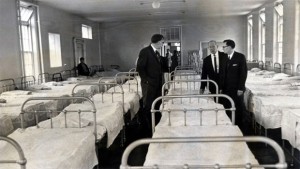Former patients and staff have come together to tell the inside story of Ely Hospital for a new exhibition at the Cardiff Story museum. All this week, CLARE HUTCHINSON looks at the forgotten history and fascinating stories uncovered by learning disability group Cardiff People First, starting with a history of the institution
IN 1967, a long-stay hospital for people with learning disabilities hit the headlines in a way which had rarely happened before.
Ely Hospital, built in 1862 as a Poor Law institution and converted to a long-stay NHS hospital in 1948, was hit with allegations of endemic maltreatment of its patients, including cruelty, verbal abuse, beatings, stealing of food, clothes and other items, indifference to complaints, lack of medical care and medication used to sedate patients.
“We must never forget,” said one former resident who lived in the hospital for most of her life. “It was a terrible place”.
The subsequent Ely Inquiry in 1969 exposed a hospital cut off from the mainstream, with little or no staff training and overcrowded wards. A White Paper followed in 1971, which eventually led to a total transformation in the way people with learning disabilities are cared for.
Labour AM for Cardiff West and Cardiff University professor Mark Drakeford is an expert on the Ely Inquiry. “It was very shocking at the time,” he said.
“It was the first major hospital scandal of the post-war period and it really hit the headlines, both locally and nationally. Part of the scandal was that these were bad things going on in a hospital, which was supposed to be a place where people were cared for.”
It would be almost another three decades until Ely Hospital finally shut its doors and its patients were resettled in the surrounding community.
In total there were 18 reports between 1968 and 1980 in which allegations of maltreatment of patients were investigated in what were then known as ‘mental illness’ and ‘mental handicap’ hospitals.
Prof Drakeford said: “Politically, the biggest impact it had was that an advisory review was set up as a result of the report, which could go in and look at the quality of medical care that was being offered in long-stay hospitals.
“There is always a need for vigilance where institutions are concerned because they can become isolated.
“In any institution there is a tendency for it to become a bit inward looking and cut off from the standards that are expected elsewhere, which is why regular inspection and visits are so crucial. The big thing that it did was it started the movement for closure on a path that means that today there are almost no institutions like this anywhere in the UK.”
Tomorrow: What day-to-day life at Ely Hospital was like, as told by those who were there.
